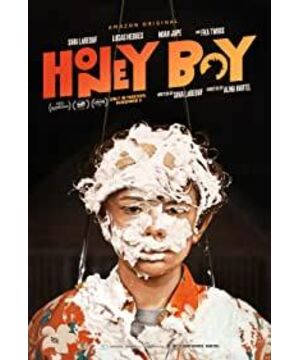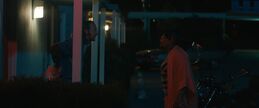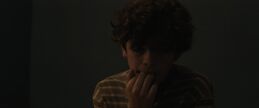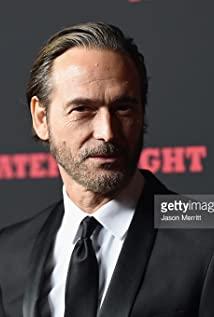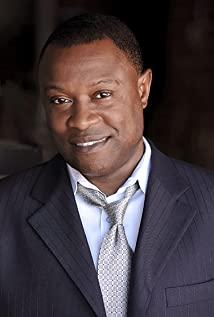Author: Eric Kohn
The translation was first published in "Iris"
Baby Boy is a semi-autobiographical film written by Shia LaBeouf. The film is about his troubled teenage years and his struggles through adolescence at the hands of his abusive father, a manly character played by LaBeouf himself with a disturbing machismo. Just one of the few misplacements and coincidences in the movie. "Baby Boy," the feature debut of expressionist documentary filmmaker Alma Haller, benefits from her keen observation, even when translating real-life trauma into a conventional narrative.
However, even though "Baby Boy" adopts the traditional narrative structure of traumatic childhood, it still expresses a deeper interpretation in the first shot: Shia LaBeouf in 2005 - the character in the film is renamed Ao Teas (Lucas Hedges) – Shot some explosive special effects in a big Hollywood production, this one is, of course, Transformers. In one dense montage, we see Otis on a packed schedule, indulging in drinking and accosting, all the while he doesn't say a word, before he gets into an accident, is escorted to the police station, and rehabilitates. The film's flashback begins when therapist Laura San Giacomo urges him to look back at his past: Back in 1995, a preteen Otis (Noah Jupe) finds himself in a In another seemingly illusory set, the image of the abandoned child tells us that this play can only be "Stephens".
From here, "Baby Boy" enters a two-dimensional narrative, connected by LaBeouf's father (the name in the film is James, the name in real life should be Jeffrey), the down-and-out father pushes A series of bad decisions led LaBeouf through a series of bad decisions that led to LaBeouf's rocky life trajectory. Then, diagnosed with post-traumatic stress syndrome, Otis, in his mid-20s, began resorting to flashbacks to make sense of his broken family. While Hedges gave the character a shy look and an explosive temper, much of the film belongs to the younger Otis. Fortunately, Jupe is the shining point of the whole movie. He once had an amazing performance in "A Quiet Place". This time, in "Baby Boy", it can be said that a small universe broke out, and it has well shaped a small universe. The image of a boy who is irritable and confident has always been affected by the violent behavior of his father.
Jupe's subtle changes are in stark contrast to LaBeouf's exaggerated transformation, with his wigs, shoulder-length hair, side beards, and a beer belly—yet, there's something about the nasal southern accent. Hard to accept, no matter how close he is to the real person. However, LaBeouf's slightly exaggerated performance is getting better, and we can get to know James more fully through a series of events: a sex offender, a Vietnam War veteran, divorced from his wife, drug trafficking, James almost fits the image of a "second-rate father". every trait. The only thing that's based on real life without being objectionable is that he makes a living as a clown.
The plot that follows has many stylized plots, one more awkward than the other: repeated prompts for James' refusal to hold his son's hand; Otis' warm relationship with the motel community's sister-next-door (Twig Girl), who is also his The only tinge of warmth in life; the psychoanalysis of rehab sessions in cheap stores, all with more or less the jerkyness of a debut script.
LaBeouf's self-analysis is too straightforward and uses too much self-reflection. "I'm an inferior adult!" Hedges declared early. Fortunately, in the progression of these scenes, earlier episodes gave us an intriguing foundation to unearth the various legitimate challenges LaBeouf faced, as well as a downright face project. This is thanks in large part to the talented director: Haller's visual style is brought to full use in her lyrical documentaries Bombay Beach and True Love (which LaBeouf executive produces), both of which are mixed The non-fiction and choreographed scenes also make her the perfect choice to direct this high-concept, autobiographical film.
The best thing about "Baby Boy" are some cute moments from Otis' youth, with Alex Summers' evocative soundtrack. Otis wanders between brightly disparate venues and dark, squalid hotels, struggling between two opposing worlds in search of security. As the film gradually presents the protagonist's exploration of emotional catharsis, it also succeeds in arousing the sympathy of the audience in this struggle.
Of course, understanding "Baby Boy" requires a broader grasp of each scene. When the grown-up Otis broke into the therapist's office to announce his epiphany, he said, "Are you being sincere with me, or are you teasing me?" A counterattack responded, "Both." After many years of coping with the mask, he finally got a positive response, but he just opened the door without staring at what was inside.
Given that the film's story is based on the true events of the celebrity, "Baby Boy" has also gained a lot of buzz for its off-set news. But the film does not contain any racial remarks that LaBeouf made to officers after his arrest in New Orleans. Nor did he get drunk on Broadway theaters. There is no examination of his bizarre 2011 short film that he was accused of plagiarizing, and the fact that he hired a plane to draw the words "Sorry" over Los Angeles. Instead, by focusing on fatherhood, Baby Boy is more of a cliché about growing up in difficult circumstances. However, the film's charm is firmly tied to LaBeouf's unique acting career, so it's a pity that the aforementioned events were not presented.
Those flaws aside, "Baby Boy" is still a captivating film, and it also provides the necessary perspective for those who care so much about the cast's tidbits. As his autobiographical story, "Baby Boy" also features LaBeouf's other self-referential projects, including the amusing "#ALLMYMOVIES" (LaBeouf watches his own movies in a row in a New York theater while performing non-stop 's live broadcast), the disturbing public exhibition "#IAMSORRY" (inviting anyone who would line up to sit down while he himself wore a paper bag with the words "Sorry" written on it). And of course the time he walked down the red carpet wearing a mask that read, "I'm out of breath."
While these gimmicks are destined to further disorient LaBeouf and annoy many viewers, Baby Boy has actually made an olive branch. The film should be seen more as a confession than a mere film, and LaBeouf uses the medium he is most familiar with to explore channels for emotional outlet. Overall, while "Baby Boy" remains a familiar coming-of-age story, it also makes a welcome twist—an elusive star with a sincere attempt to bring star mythology to the ground.
View more about Honey Boy reviews


